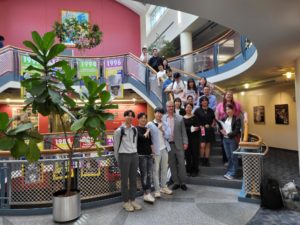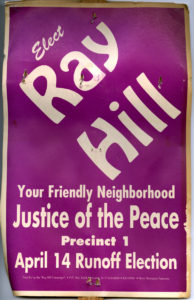
Season’s greetings! I just thought I’d share with you all some of the engagement around the LGBTQ+ History Research Collection in support of research, learning, outreach, and community-building in 2023. Here are just some of the highlights….
October 24, 2023. Members of the U.S. Department of State’s International Visitors Leadership Program visited UH Special Collections as part of their study tour to learn the history and advocacy of local and regional LGBTQ+ communities.
We have been building and processing the collection. We accepted several new collections or accruals from the community, including materials from the Arden Eversmeyer estate, JD Doyle, Patrick McIlvain, an anonymous donor who donated issues of This Week in Texas (TWT), and others. A couple of other important donations are about to have a new home here in Special Collections and we can’t wait!
Additionally, Project Archivist Katy Allred processed the Log Cabin Republicans of Houston Records, PFLAG Houston Records, and more materials from Town Meeting 1. Currently, Katy is processing the Houston GLBT Community Center Records. There are so many interesting and sometimes surprising things to learn in these collections! Come visit UH Special Collections to check them out in our reading room. Building and processing the collection continues!
We have an ongoing project with UH professor Dr. Guillermo De Los Reyes called the Cougar Rainbow Histories project, which is about preserving the history that led to the creation of the UH LGBT Studies Minor and the UH LGBTQ Resource Center (disbanded as of Sept 1, 2023). Special Collections’ role for the project is to conduct oral history interviews with the people who were involved in planning and bringing the Minor and Center to fruition. So far, we have recorded five oral history interviews, which will soon be available for research.
Five undergraduate students interned with us in 2023 to preserve LGBTQ+ history—three students worked with materials in the collection while two students conducted oral history interviews for the Cougar Rainbow Histories project. So far, we have not had to recruit interns because students are so enthusiastic about preserving and interacting with materials that document LGBTQ+ history that they proactively contact us. The new capstone intern who is lined up for Spring 2024 contacted me back in September! It’s heartwarming to work with such enthusiastic, bright, and creative students.
We created the Hollyfield Foundation Pride exhibit, which was located in front of UH Special Collections. The theme for the exhibit was FAMILIES and we, along with intern Dafne Meza Flores, selected materials from the collection to provide a space for visitors to consider the impact of families, broadly defined, on the lives of LGBTQI+ people in historical and contemporary contexts.
We participated in the 2nd annual Families with Pride event, which was hosted by Houston Council Member Abbie Kamin on June 24th at Levy Park. It was certainly hot, but luckily, our history tent had a huge fan and was located in the shade amongst the loveliest of trees. Not only did we exhibit materials from the collection, but we also created an activity for attendees of all ages, which was to write a message or draw a picture (or both!) for people in LGBTQ+ communities to encounter in the future. Complete with a puppy parade, the Families with Pride event was an absolute success! LOVE was the key word of the day. The messages and drawings are being preserved in UH Special Collections, but we plan to collect more at other future events. Come check out this one-of-a-kind living collection!
In October, we celebrated LGBTQ+ History Month. Banners from The Banner Project were draped in the library atrium, staircase, and walls on the 2nd and 3rd floors, and on October 11th, we once again featured a pop-up exhibit of collection materials in the atrium in honor of National Coming Out Day.
On October 23rd, we hosted an event titled Readings from the Road, which featured a panel of speakers who read or reflected on their research and/or experiences traveling and/or navigating spaces and places as members of the LGBTQ+ community. I had the privilege of facilitating the event and kicked off the panel by reading an introductory excerpt from my own essay based on research in Texas archives, “(En)countering the Archival Sidekick,” which was published in the anthology, Q&A: Voices from Queer Asian North America. The engaging speakers were Dr. Guillermo De Los Reyes, local LGBTQ+ historian, author, and one of our collection donors JD Doyle, UH librarian Imani Spence, and UH GLOBAL president Kaitie Tolman. Light refreshments were served, including crowd-pleasing conchas.
The following morning on October 24th, we welcomed a delegation of 14 researchers, journalists, activists, lawyers, artists, and NGO leaders in the Korean LGBTQI+ community who were part of a study tour to learn about LGBTQI+ advocacy in the U.S. through the Department of State’s International Visitor Leadership Program. The group visited only three U.S. cities and Houston was one of them! Aaaaand UH Special Collections and the LGBTQ+ History Research Collection was their first stop in Houston. What an incredible honor! It was SO memorable to meet and talk with these leaders and also to use some of the banners from The Banner Project as tools to discuss Houston’s vibrant LGBTQ+ history and advocacy. Mission accomplished.
Throughout the year, we also worked with UH faculty and beyond to connect the LGBTQ+ History Research Collection with their lesson plans and led tours for UH faculty and students, potential donors, and community organizations. We’re here to support research and learning, events, community-centered projects, and other goals and interests relevant to the collection. Contact us!
As you can guess, there’s much more that goes into preserving local and regional LGBTQ+ history, including building meaningful relationships with people across campus and many communities. This is essential to our work, and it is certainly rewarding.
Well, that’s all for now. But be in the lookout for more in Spring 2024!
Happy holidays!
Joyce Gabiola, MSLIS | UH alum
Archivist for the LGBTQ+ History Research Collection
University of Houston Libraries – Special Collections
Explore history at UH Special Collections! Our reading room is open Monday-Friday, 10:00 AM-4:00 PM. Appointments are strongly recommended so that requested materials can be ready for you upon your arrival. Drop-in visits are welcomed if there is available space in the reading room.
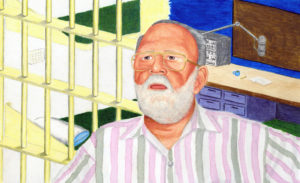
Detail from a painting of Ray Hill, from the Ray Hill Papers
Timing and happenstance played a large role in the personal papers of Ray Hill coming to the University of Houston. What started over a year and half ago, first through a visit by documentary filmmakers to UH Special Collections looking for footage on Houston’s LGBT Community during the 1970s, led not only to an introduction to Ray Hill, but developed into several subsequent conversations and meetings with Ray over coffee at the local Montrose Starbucks in Hawthorne Square. Ray held us as a captive audience, regaling us with stories of his time in prison for burglary, to his release and work in Houston’s LGBT community, to meeting and going toe to toe with the legendary Harvey Milk, and most importantly his Prison Show on KPFT. As he would describe it, the Prison Show served as a lifeline to prisoners, connecting them to their families and the outside world that no prison wall could keep out.
He was a master at holding court and was never short of words, wit, humor, and wisdom given at the right moments. “Ray Hill, Citizen Provocateur,” as listed on his business card, was a self described writer, activist, actor, and raconteur to name but a few of the titles to which he laid claim. Ray was not someone to meet, but someone to experience. A force of nature and larger than life, he was completely at home whether talking with political dignitaries on issues concerning prison reform or to members of the LGBT community seeking him for counsel and personal advice. Ray’s genius and brilliance were not in the telling of the truth, but in the telling and retelling of the story that made you believe, or at least made you think.
For a man like Ray Hill, who fought against the system for so long, one might think it ironic that he would place his personal archives with the University of Houston Libraries Special Collections. It made sense when we spoke to Ray on the significance UH libraries had on his life and how it shaped his formative years. As Ray would tell it, even before he was old enough to be a university student, he would sneak into the library stacks to find books that helped him discover or understand himself as a gay man. Placing his personal archives at UH, he is contributing to that exploration and understanding for current and future generations of students. Ray’s papers are now a major part of the Libraries’ significant LGBT historical collections alongside the Annise Parker Papers, the Gulf Coast Archive & Museum of GLBT History collection, the Diana Foundation Records, and many others. It is really an honor for us that Ray entrusted UH Libraries to preserve his history and make it accessible to our campus and our community.
The Ray Hill Papers collection contains 62 boxes of correspondence, awards, organization documents, photographs, audio/video recordings, publications, and artifacts that document Ray’s life and work as an LGBT community activist and prisoners’ rights reformer. His archives document the various aspects and endeavors of a complex individual whose work has affected so many in the community and beyond, capturing a life well-lived.
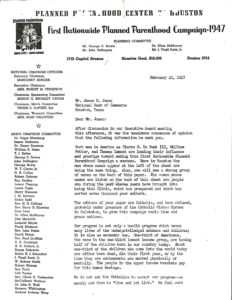
“The editors of your paper are Catholic, and have refused… to give this campaign radio time and press notices… We do not ask the Catholics to accept our program–we merely ask them to ‘live and let live.'” Letter from Agnese Carter Nelms to Jesse H. Jones, February 10, 1947, Planned Parenthood of Houston and Southeast Texas Records.
A new collaboration between the University of Houston Special Collections, the Department of History, and the Women’s, Gender & Sexuality Studies provided students with a unique opportunity to discover archival collections neatly aligned with their own areas of research interest.
Students from Dr. Zarnow’s Issues in Feminist Research class worked with librarians from our Special Collections to mine a variety of archival artifacts in collections from Carey C. Shuart Women’s Research Collection, the LGBT History Research Collection, and the Arté Publico Press Recovery Project to create an interactive timeline of primary sources discovered in their research. From materials tucked into archival folders, possibly overlooked by previous researchers, students uncovered items revealing the evolution of women’s social issues and concerns in the Houston and Gulf Coast region and the themes that connect these years of seemingly disparate work from a chain of individuals and organizations over decades.
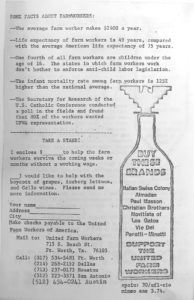
Boycott Gallo flyer, Houston Area NOW and Other Feminist Activities Collection.
Among the items highlighted from their research are correspondence from the 1940s, political flyers from the 1970s, and artists’ creations from the 1980s. In the Planned Parenthood of Houston & Southeast Texas Records, a 1947 letter from Agnese Carter Nelms to Jesse H. Jones, owner of the Houston Chronicle among other things, hints at the early conflicts between Planned Parenthood and the Catholic Church. A flier from the Houston Area NOW and Other Feminist Activities Collection recalls the gains won by César Chávez and the United Farm Workers but reminds us that, even now, there’s still blood in that wine. Meanwhile, photographs, posters, and other works of art from the Houston Gorilla Girls Records demonstrate how activism for gender equality in the world of art played out against the backdrop of 1980s Houston. Students worked to curate and describe these items and more, creating an interactive timeline (seen above) to provide users with visual and historical context while browsing their findings.
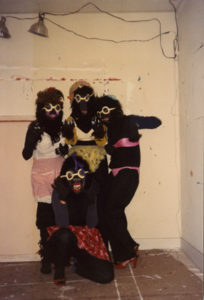
Photograph from the Houston Gorilla Girls Records.
If you are a faculty member, or student, interested in how the primary source materials housed in UH Special Collections can complement your teaching, learning, and research, see our website with more information on scheduling classes and utilizing our resources to learn more.
